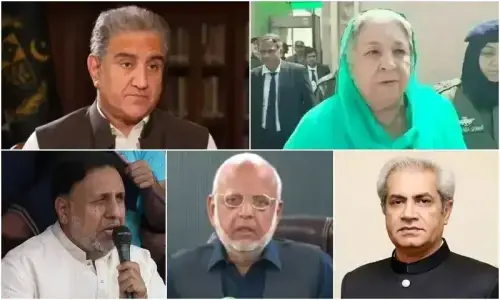THE PTI has made serious allegations of rigging in the 2013 elections. For the survival of democracy, elections must be periodic, fair and free.
The courts are, therefore duty bound to examine the allegations without being unduly hyper technical in their approach and without being oblivious of the ground realities (Ponnala v Reddy 2012 SCC (7) 788 at 802).
It appears there is likelihood of the establishment of a tribunal to deal with the matter. A point was raised whether the services of ISI and MI can be utilised for investigation. The British have Tribunals of Enquiry (Evidence) Act 1921. In India, there is the Commissions of Inquiry Act 1952. Pakistan has Commissions of Inquiry Act 1956.
The Indian Act through section 5 (a) empowers the commission to utilise the services of central investigation agencies for conducting investigation pertaining to inquiry.
The Pakistan Act is silent. However, on Dec 26, 1971, the Pakistan government appointed the Hamoodur Rehman Commission to inquire into the circumstances in which the commander, eastern command, surrendered.
Under the Pakistan Commission Inquiry Act, 1956, the commission examined various military officers. Therefore, there is no bar to utilising the services of investigation agencies.
The real difficulty is the report which will be submitted by such a commission. The statutory provisions in this regard in India and Pakistan are somewhat similar. In Dalmia v Justice Tendolkar (AIR 1958 SC 538), a constitution bench of the Indian Supreme Court held as follows: “The commission is merely to investigate, record its findings and make its recommendations which are not enforceable proprio vigore. The inquiry or report cannot be looked upon as judicial inquiry in the sense of its being an exercise of judicial function properly so called.
“The recommendations of the commission of the inquiry are of great importance to the government in order to make up its mind as to what legislative and administrative measures be adopted to eradicate the evil found or to implement the beneficial objects it has in view. But seeing that commission of inquiry has no judicial powers and its report will be recommendatory and the statement made by any person before the commission of inquiry is, under sections 6 of the Act, wholly inadmissible evidence in any future proceedings, civil or criminal.”
These observations were approved by a bench of seven judges in state of Karnataka v Union of India (1977 (4) SCC 608). They were finally approved by Supreme Court of India in Maqbool Ahmed v RamTyagi (2011 (7) SCC 95).
It was further held: “The courts were not bound by the report of findings of commission of inquiry and the courts have to arrive at their own decision on evidence placed before them in accordance with law.”
It is, therefore, suggested that the Supreme Court of Pakistan may deal with matters in its suo motu jurisdiction. Let the chief justice constitute an appropriate bench to hear and decide the matters.
S.S. Pirzada
Senior counsel, Supreme Court of Pakistan
Ex- secretary-general, OIC
Islamabad
Published in Dawn, December 17th, 2014


































